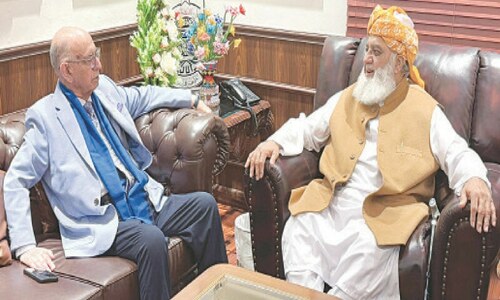THE British House of Commons reconvened on April 21, 2020, after the Easter recess and straightaway adopted a motion to hold its sittings under a ‘hybrid model’ allowing approximately 50 of its 650 MPs to attend the sittings in person and 120 others to join virtually via video link. The House of Commons Commission also approved 20 virtual committee meetings per week. This was a significant departure from the British parliament’s 700-year-old tradition of holding its sittings in person only.
On the same day in Pakistan, a Special Parliamentary Committee on Virtual Sessions constituted by the National Assembly speaker met and decided just the opposite. The committee convened two more sittings — on April 30 and May 5 — to formalise the decision to rule out any other mode of sitting except in person. In the meantime, the Senate Committee on Rules of Procedure and Privileges met on April 23 and reached the same decision. Although the Special Committee on Virtual Sessions was tasked to propose amendments in the Assembly Rules of Procedure, if necessary, media reports did not indicate that the committee did this. The Assembly did not take up the issue either during the three days it met recently, meaning we would again need at least one in-person sitting to approve the amendment to the rules.
The National Assembly and the Senate Rules of Procedure do not explicitly rule out a virtual or hybrid session nor do they explicitly allow one. It is simply a case of not imagining at the time of writing these rules a situation like the one we are facing at present and therefore the language of the rules is oriented to the physical presence of the members.
For example, National Assembly Rule 30 (e) states: “While Assembly is sitting, a member shall keep his usual seat while addressing the assembly.” This rule does not necessarily bar a member from participating or speaking virtually but because of the phrase “his usual seat” it may be prudent to amend this and similar rules to accommodate a virtual sitting.
It is imperative to move with the times.
Although the need to amend the Rules of Procedure of each legislature is understandable, some parliamentarians extend the argument to the Constitution as well and cite, for example, Article 54 which requires the president to designate a ‘place’ while summoning either or both houses of parliament. These experts feel that since a virtual presence will not be at the designated place like the parliament building, it will be impossible to designate ‘a place’. Another example is Article 55 in which voting in the Assembly is described as “…all decisions of the National Assembly shall be taken by majority of the members present and voting…”. They feel that this article requires the members to be physically present. It seems like stretching the argument too far. Even for a virtual or hybrid session, the speaker and his staff sits in the parliament building and therefore the designation of the “place” as mentioned in Article 54 should not be a problem. Similarly, the word “present” in Article 55 cannot be interpreted as ‘physically present’. Since a member can hear, watch, speak and even vote during a virtual sitting, he or she should be deemed to be present for all practical purposes.
In addition, it was mentioned by an opposition party leader that since the cabinet representing the executive is meeting physically and the judiciary is holding its proceedings physically even during the pandemic, why can’t the third branch of the government — the legislature — hold its sittings in person. This argument is not so valid because the Supreme Court has held several hearings via video link and plans to extend this practice in future; the prime minister has presided over several high-level meetings including the National Coordination Committee meetings and even some recent corps commanders meetings have also been held via video link.
Parliamentary sessions are unique in the sense that travel of a majority of parliamentarians running into hundreds is necessitated for an in-person parliamentary sitting which is not the case for the judiciary or cabinet. This travel poses huge risk and challenges in the days of pandemic when air and train services are at least partially suspended. Parliamentary committees are already holding their sittings in hybrid mode allowing members to join virtually. In the past four meetings of the Parliamentary Committee on Covid-19 chaired by the National Assembly speaker, roughly 20 per cent members have attended via video link.
It is imperative to move with the times and make a provision in the rules for a virtual and, preferably, a hybrid sitting of legislatures only in case of an emergency like at present and subject to consensus in the Business Advisory Committee. It is not wise to risk the well-being of the national political leadership.
The writer is president of Pildat-Pakistan Institute of Legislative Development and Transparency.
Twitter: @ABMPildat
Published in Dawn, May 17th, 2020












































